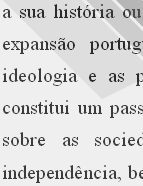

................................
The economic, social and cultural processes of the oceanic expansion were hidden. History as the search for truth was of no interest, it was reduced to a rhetoric of commemoration and justification of imperial 'greatness'" (Godinho, Mito e mercadoria [Myth and merchandise...,] 1990, 13-14).
Godinho had worked since the 1940s towards the renewal of the historiography of the Portuguese expansion - through the publication of documentation, the critique of sources and a theoretical and methodological reflection conceived in the light of contemporary European historiography (Annales) -, and he gave it an international dimension marked by a comparative perspective and its constant integration into the issue of the construction of the modern world, while highlighting the political and ideological use of history at the service of the Estado Novo.
The years 1959 to 1962 marked the end of a period of great publications such as História dos Descobrimentos [History of the Discoveries] by Duarte Leite, Os Descobrimentos Portugueses [Portuguese Discoveries] by Jaime Cortesão, and also, in the field of cartography, the Portugaliae Monumenta Cartographica, which paved the way for new studies. Three less ambitious and shorter innovative works emerged, revealing new thematic and methodological perspectives: Aspectos e Problemas da Expansão Portuguesa [Aspects and Problems of the Portuguese Expansion], by Orlando Ribeiro, Introdução à História dos Descobrimentos [Introduction to the History of the Discoveries], by Luís de Albuquerque and the censored Economia dos Descobrimentos Henriquinos [Economy of the Discoveries under Prince Henry the Navigator], by Vitorino Magalhães Godinho.
But a key fact is particularly noteworthy: the issue of the autonomous organisation of the history of the Others has never been a real concern of Portuguese historians, even if Godinho's universalist perspective sought to pave the way for "a new way of looking at the world (...) [for the recognition of] the unity of men in the diversity of their societies and civilisations" (Mito e mercadorias..., 1990, 55). And as early as 1947, Godinho claimed that " European-centrism, which has dominated historical construction, must be banished so that authentic universal history is possible. The study of Morocco, the Canaries, the Sahara, Guinea, Angola, India, China, etc., is important for the knowledge of different structures to those of Europe and of equally diverse lines of transformation " (História económica e social da expansão portuguesa [Economic and social history of the Portuguese expansion]. 10).
